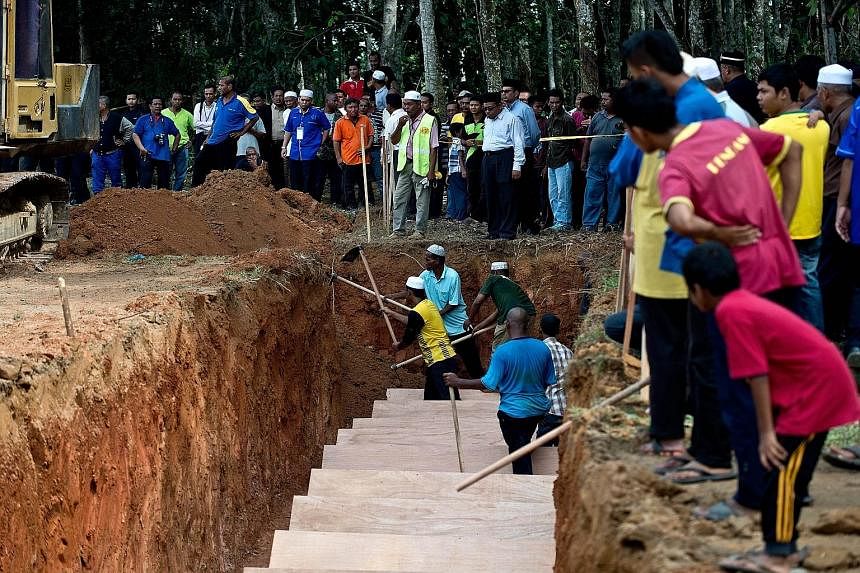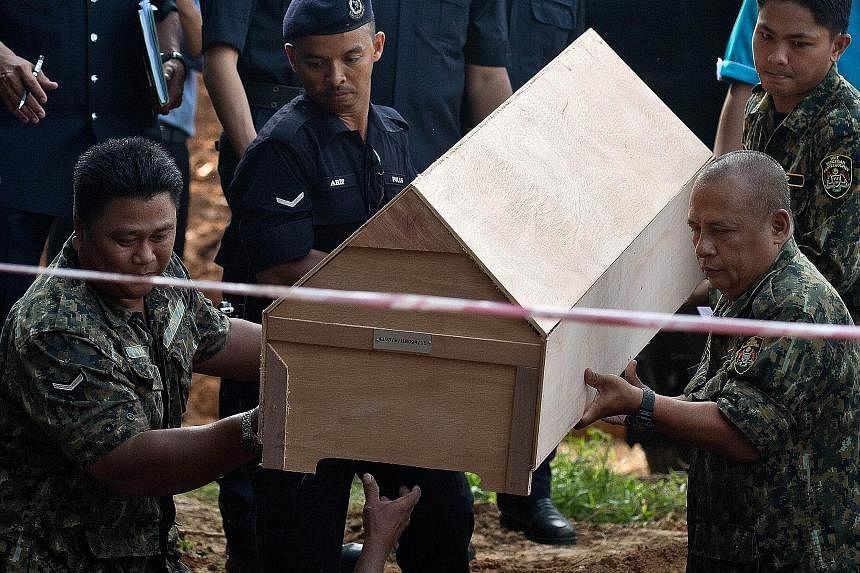KAMPUNG TUALANG (Kedah) - The Malaysian authorities held a sombre mass funeral for 21 suspected ethnic Rohingya found in human-trafficking graves last month, with fellow Muslims praying for the unidentified victims to find a place in heaven.
The remains were what police said were the first of 106 exhumed so far from pits at trafficking camps found late last month in jungles in northern Malaysia along the Thai border, a discovery that laid bare the brutal extent of the region's migrant crisis.
Yesterday, about 100 local villagers offered quiet Muslim prayers as 21 wooden coffins - containing 19 men and two women - were lowered into deep graves cleared by earth-movers at an Islamic graveyard in Kedah.
The discovery of camps and graves on both sides of the Thai-Malaysian border and a flood of thousands of starving boat people to South-east Asian shores last month have highlighted the plight of the Rohingya.
A Muslim minority from Myanmar, they have for years sought to escape what they say is worsening persecution by the country's Buddhist majority.
Fleeing abroad by the thousands each year, they typically put their lives in the hands of often brutal smugglers and traffickers who arrange a perilous passage by sea and land, usually to Muslim-majority Malaysia.
"These are innocent Muslims, like brothers and sisters to us. We are really sad that they had to undergo misery and pain. I am sure they will take their rightful place in the heavens above," said Mr Mohamad Yusuf Ali, 57, a local carpenter of Rohingya origin.
Despite not knowing the unidentified victims, scores of Malaysians and Rohingya turned out for the ceremony in the sleepy village of Kampung Tualang despite fasting for the month of Ramadan.
"I hope Allah will punish the criminals who were responsible for their deaths. The Rohingya people did not do anything wrong. They were only looking for a better life," Mr Mohamad Yusuf said.
A Malaysian police officer, speaking on condition of anonymity, said the remains of 106 people had been exhumed so far and that post-mortems were still being conducted on most of them.
Police had earlier said 139 grave sites were found at more than two dozen abandoned jungle camps in Perlis. They have still to provide a final tally of the dead or the suspected causes of death.
The authorities said last month that 12 Malaysian police officers were being investigated for possible involvement in the camps, but no new information on their investigations has been released.
All this came after Thai police found seven camps and 33 bodies on their side of the border. Fifty-one people have been arrested, including a senior army general, and more are being sought.
Rights groups, which have long accused the Malaysian authorities of tolerating abusive human trafficking, and the United States government have called for a full and transparent investigation.
AGENCE FRANCE-PRESSE


